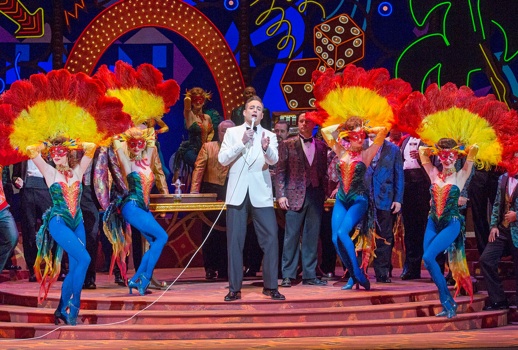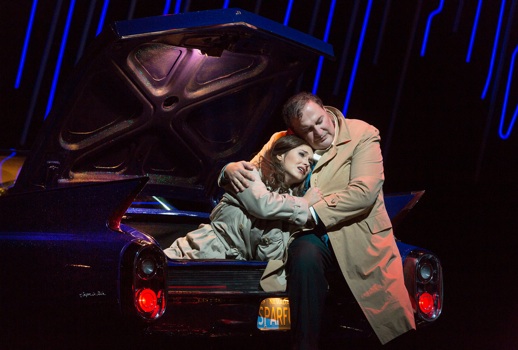

I just shake my head as I read again and again that recent new productions at the Met are “destroying” opera, particularly where bread-and-butter repertory like La Traviata and Tosca are concerned. I chuckled too when I read a music teacher complain that she could not bring her “kids” to this Rigoletto due to the topless pole dancer who undulates for a few moments at the beginning of the third act; she didn’t mention the production’s frequent smoking which no doubt would be equally off-putting. Apparently rape, kidnapping and murder-for-hire are just dandy as long as presented in a “reverent” production set in the long ago and far away.
While no fan of Luc Bondy’s Tosca which I’ll see again next week with Angela Gheorghiu, I find Willy Decker’s starkly contemporary vision of Violetta’s tragedy devastatingly effective. And for me, Mayer’s re-envisioning of Rigoletto gets a few things wrong but a larger number of things right. While the Duke’s power and influence aren’t convincingly explained in a 20th century context, the decadent world from which Rigoletto attempts to shield Gilda is strikingly evoked, thanks in part to Christine Jones’s bold neon-studded sets. Just what role Rigoletto plays in this world though—toady? sidekick?– remains confusing.
However, the opera’s action is, for the most part, cleverly—and clearly—presented. Although the business with the elevators during Gilda’s abduction gets a bit muddled, I do relish its witty use of the first scene’s sarcophagus. The machinations of Marullo and Borsa, particularly their interactions with Ceprano, play out with rare clarity, and the lovesick Gilda writing about Gualtier Malde in her diary provides a piquant counterpoint to “Caro nome.” The canny transformation of Sparafucile’s lair into a strip bar/brothel chillingly conveys just how depraved Rigoletto’s fateful thirst for revenge has become.
Although Mayer’s return to supervise didn’t result in any major changes, this revival looked fresh and well-rehearsed. Its principal strength was the taut, propulsive conducing of Pablo Heras-Casado returning to the opera in which he made his Met debut in 2013. After Marco Armiliato’s excessively modest Trovatore several weeks ago, it was a pleasure to encounter such bold and crisply articulated Verdi playing from the orchestra and such vigorous singing from the male chorus which has been in fine form all season.
The principal singers, unfortunately, were a very mixed bag. While grateful to have such a confident and experienced Rigoletto as George Gagnidze, one searched in vain for some vocal beauty, some special dramatic insight. He sang with bite and intensity but also with an unremittingly gray tone, and the fascinating extremes of Rigoletto—his caustic mocking of Monterone to his fierce devotion to his daughter—were slighted. The character’s decline and fall seemed merely sad, not tragic.

Although one suspects that Donizetti might be a more congenial composer for Costello than Verdi, he was in better form Tuesday than he had been as Percy at the season premiere of Anna Bolena. While his tenor retains some of its sunny appeal, he again sounded strained at the top. Though individual notes were pleasant, he seemed unwilling to knit them together into phrases. While reports have argued that Costello had put some recent rough patches behind him, his two recent Met outings suggest otherwise.
After being gravely disappointed at her debut as Elvira in I Puritani, I had hopes that Olga Peretyatko might redeem herself as Gilda, a role she is also singing in Madrid, Vienna, Berlin and Paris this season. While a lovely and touching actress, her singing was again consistently unimpressive. It was difficult to imagine a more unmagical “Caro nome”: despite diligent trills, her punched out, awkward high notes jarred. Although the top can be full and clear, the middle and lower parts of the voice are muddy and undistinguished. Like Costello, she rarely displayed an idiomatic feel for Verdi’s line, and legato proved as elusive to her as it had to her tenor.
Familiar from the production’s premiere, Stefan Kocán continued to revel in Mayer’s amusingly slimy Sparafucile but his ugly rapid vibrato gave little pleasure. When one could hear her, debuting Katarina Leoson revealed a rich colorful mezzo as Maddalena but she lacked the strong, aggressive lower register to cut through the quartet and the storm trio. Another veteran of the premiere, Maria Zifchak, remained incomparably blowsy as the greedy Giovanna.
And yet despite all my reservations, somehow the unstoppable Verdi still worked his magic, and I mostly enjoyed the evening. The friend who accompanied me, not a regular opera-goer, was transported by the music and unfazed by the substitution of 60s Vegas for 16th century Mantua. She found Mayer’s “Broadway” theatricality involving and enjoyed the production’s spicy updated titles in which Maddalena calls the Duke a “dreamboat” and Monterone is “taken for a ride” rather than led to his execution.
While debuting Nadine Sierra and returning Piotr Beczala and Zeljko Lucic may offer more appealing vocalism in upcoming performances than Tuesday’s motley crew did, I felt sorry for those who stayed home to grouse rather than attend—all because the Met has dumped yet another comfy production by Otto Schenk!
Photo by Richard Termine/ Metropolitan Opera.
























Comments